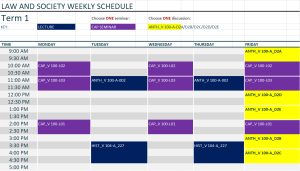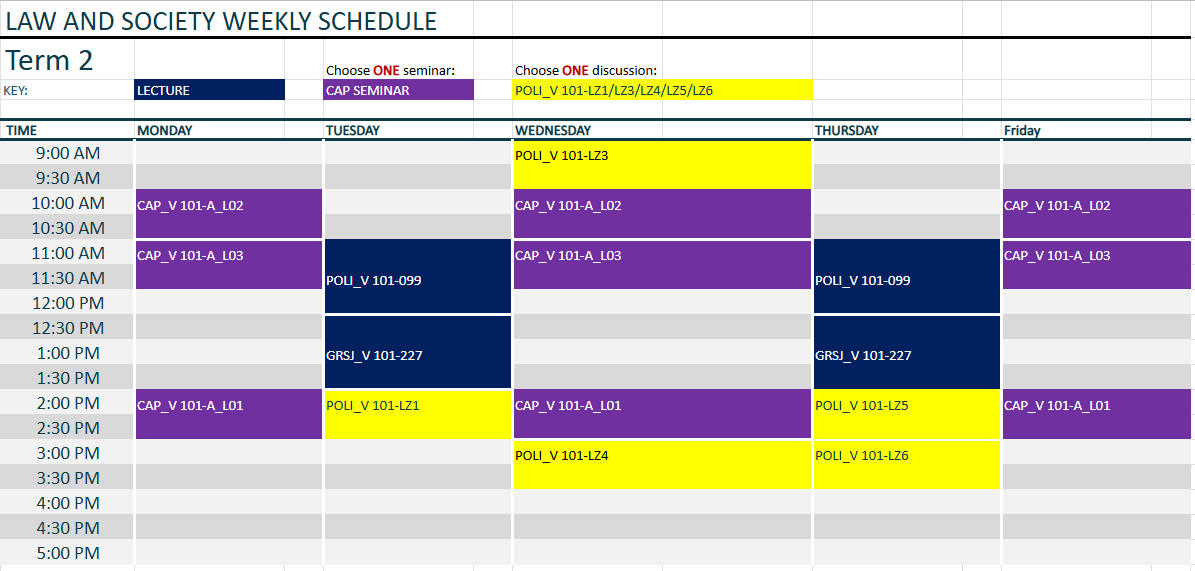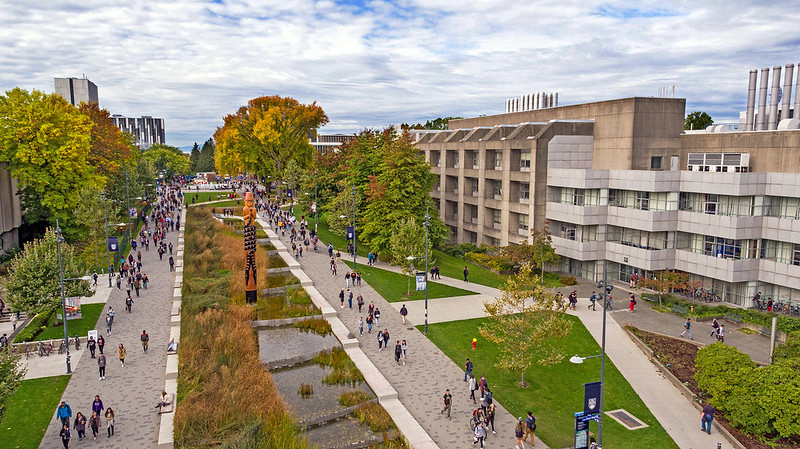This stream analyzes how society and law shape each other, using lenses from historical, literary, political, and anthropological research.
Students will also have the opportunity to work with a community organization in the legal non-profit sector. For those interested in law, community work, and social justice, this stream is a good fit.
The law and society stream put legal principles into various contexts that were immensely absorbing. CAP has also given me a much clearer understanding of where my interests lie. Before entering the program, I thought I wanted to major in political science; upon leaving the program, I’ve decided to major in anthropology, which is a field I knew nothing about before coming to UBC.
Courses: Term One
In the first term, students will enrol in CAP 100 (fulfills the academic writing requirement), Anthropology, and History. In CAP 100, you will be introduced to the research practices and features of academic writing at the university level. By looking at the political and anthropological background surrounding our society-at-large, you will examine the current relationship between law and society as well as learn about how it came to be.
Analysis of and practice in academic research and writing in the social sciences and the humanities. Restricted to students in the Coordinated Arts Program. Credits count toward the Writing Component of the Faculty of Arts Writing and Research Requirement.
This course is not eligible for Credit/D/Fail grading.
For more information about the connections between CAP 100 and CAP 101A, please visit this page.
CAP_V 100-L02 (MWF 10-11), and CAP_V 100-L03 (MWF 11-12) - Instructor: Dr. Evan Mauro
In this seminar students will learn how to do academic research on “law and society,” an interdisciplinary field of study. We will explore a range of approaches to the law from the humanities and social sciences, and students will conduct their own research, learning how to locate, evaluate, and critique academic arguments in their own research and writing. “Law and Society” as an intellectual movement was founded on the truism that “law is too important to leave to lawyers”; accordingly, we will balance insider perspectives of legal technicians (lawyers, judges, police, legislators) with critical views from outside the criminal legal system and legislatures.
ANTH_V 100-A_002 (TTh 11-12) - Instructor: Amirpouyan Shiva
Basic concepts and methods of anthropology; culture and race; comparative study of social systems, religion, symbolism, art, and other institutions. Examples are drawn from a variety of cultures.
HIST_V 104-A_227 (TTh 3:30-5) - Instructor: Dr. Bradley Miller
Thematically-organized topics will explore global aspects of human experience across time. Each section will examine a single theme. Check with the department for course offerings.
Courses: Term Two
In the second term, students will transition from CAP 100 to CAP 101A, and be introduced to the studies of Political Science and Gender, Race, Sexuality, and Social Justice. Students will acquire a new perspective of our laws and society by studying it through the lens of anthropological and feminist frameworks.
Applications of research and writing skills in the context of literary, cultural, and media analysis. Topics integrate CAP stream themes and vary each year. Restricted to students in the Coordinated Arts Program.
This course is not eligible for Credit/D/Fail grading.
For more information about the connections between CAP 100 and CAP 101A, please visit this page.
CAP_V 101-A_L02 (MWF 10-11), and CAP_V 101-A_L03 (MWF 11-12) - Instructor: Dr. Evan Mauro
In “Literature, Law, and Justice,” we will focus on how laws can establish, maintain, or contest injustice.
To do this, we will read literary accounts—novels, short stories, poems, memoirs, films—from people marginalized or abandoned by law. We will look at how different communities organize against state violence and economic injustice, with specific attention to Indigenous land defense and Black freedom movements for abolition. The course also centrally features a community-based learning project in which we partner with community-based researchers. Students will learn to do advocacy research and writing to help create social change.
POLI_V 101-099 (TTh 9:30-11) - Instructor: Dr. Kenny Ie
Canadian governments, politics, and public policy. How policies emerge from politics contested through the interaction of institutions (Constitution, Parliament, federalism, elections, and the courts) and actors (individuals, parties, interest groups, nations). Insights are applied to explain current events and controversies.
GRSJ_V 101-227 (TTh 12:30-2) - Instructor: Dr. Minelle Mahtani
Risk, Relation, Revolution and Repair
What does it mean to read alongside an author? Does our opinion of a creative work change when we meet its creator? In this course, we examine various themes that inform social justice theory (primarily risk, relation, revolution and repair) by reading a novel or memoir by a social justice activist. We then meet that author one-on-one every week. The course will ultimately offer a renewed mapping of critical storytelling by investigating the relationship between affective pleasures of reading through theory, the discursive spaces of the academy and explore how certain readings inspire us to move towards more creative and imaginative places for renewal and revitalized conversations about epistemologies. One of the assignments for this class includes writing a letter to one of the authors you meet. A singular experience that you will never forget!
Courses: Schedule
Preview how a week looks in the stream:
Sample Projects
CBEL Project: From Classroom to Courtroom
As part of the first year experience in the Law & Society stream, students participate in community-based experiential learning (CBEL) in the CAP 101 class. This means that students have the opportunity to get out of the classroom and apply newfound disciplinary knowledge to a local community context, hearing from community speakers and visiting sites in the community.
Infographics to make research accessible
Students participate in a knowledge exchange project, translating scholarly research on the Downtown Eastside (DTES) into accessible infographics. Receiving direct feedback from research authors, students visualize and summarize published research articles for community audiences. This project builds student skills in research writing, introduces students to community-based research and knowledge exchange, and asks students to consider the role research can play in community organizing and in making social change. More on this project here.


